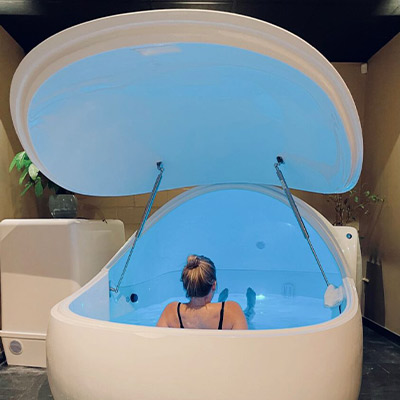What is Floating? An In-Depth Guide to This Therapeutic Practice
Floating, also known as sensory deprivation or floatation therapy, is an increasingly popular method for relaxation, stress relief, and mental clarity. This therapeutic practice involves lying in a sensory deprivation tank filled with a solution of water and Epsom salts, creating a buoyant environment that allows individuals to float effortlessly. The tank is designed to block out all external stimuli, including light, sound, and tactile sensations, providing a unique and immersive experience.
The Science Behind Floating
The concept of floating was developed in the 1950s by Dr. John C. Lilly, a neuroscientist interested in exploring the effects of sensory deprivation on the human mind. The high concentration of Epsom salts in the water creates an environment where the body becomes completely buoyant, mimicking the sensation of weightlessness. This absence of external stimuli allows the brain to enter a deeply relaxed state, often associated with meditative or trance-like experiences.
Benefits of Floating
Floating offers a wide range of benefits, both physical and mental:
- Stress Reduction: By eliminating external distractions, floating can significantly reduce stress levels. The deep relaxation achieved during a float session helps lower cortisol levels, the hormone responsible for stress.
- Pain Relief: The buoyancy provided by the Epsom salt solution takes pressure off joints and muscles, making it an effective therapy for those suffering from chronic pain, arthritis, or injuries.
- Improved Sleep: Regular floatation therapy can help regulate sleep patterns, making it beneficial for individuals with insomnia or other sleep disorders.
- Enhanced Creativity and Problem-Solving: The sensory deprivation environment allows the mind to wander freely, often leading to enhanced creativity and problem-solving abilities.
- Mental Clarity and Focus: The deep state of relaxation achieved during a float session can help improve mental clarity and focus, making it a popular choice for those looking to enhance cognitive performance.
What to Expect During a Float Session
A typical float session lasts between 60 to 90 minutes. Here’s what you can expect:
- Preparation: Before entering the float tank, you’ll be asked to shower to remove any oils or lotions from your skin. Earplugs are often provided to keep water out of your ears.
- Entering the Tank: Once inside the tank, you’ll lie back and allow the buoyant water to support your body. The water is kept at skin temperature, making it difficult to distinguish between your body and the water.
- Floating Experience: As you settle into the float, you’ll gradually lose awareness of your body, entering a state of deep relaxation. Many people report feeling a sense of timelessness and profound calm.
- Post-Float: After your session, you’ll shower again to remove the Epsom salt solution. Many float centers provide a relaxation area where you can take your time to re-acclimate to the outside world.
Who Can Benefit from Floating?
Floating is suitable for almost everyone. Athletes use it for muscle recovery, individuals with chronic pain find relief, and those seeking mental clarity and stress reduction benefit greatly. However, it’s always advisable to consult with a healthcare provider before starting any new therapy, especially if you have medical conditions or concerns.
Conclusion
Floating is a powerful tool for enhancing physical and mental well-being. By creating an environment free from external distractions, it allows individuals to experience profound relaxation, stress relief, and mental clarity. Whether you’re seeking to alleviate pain, improve sleep, or simply find a moment of peace in a busy world, floatation therapy offers a unique and effective solution.
Discover the benefits of floating for yourself and take the first step towards a more relaxed and focused you. Book a session at your local float center today and experience the transformative power of sensory deprivation therapy.

